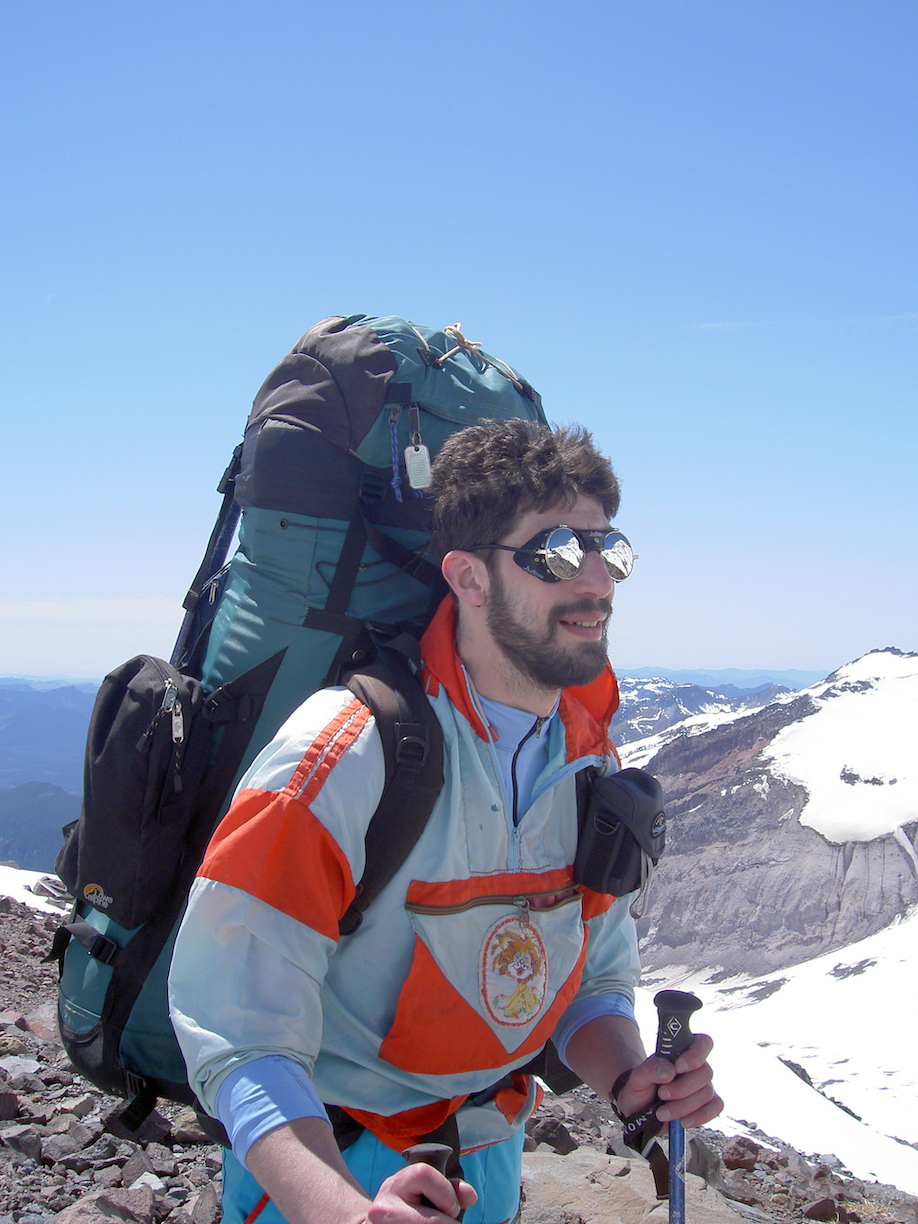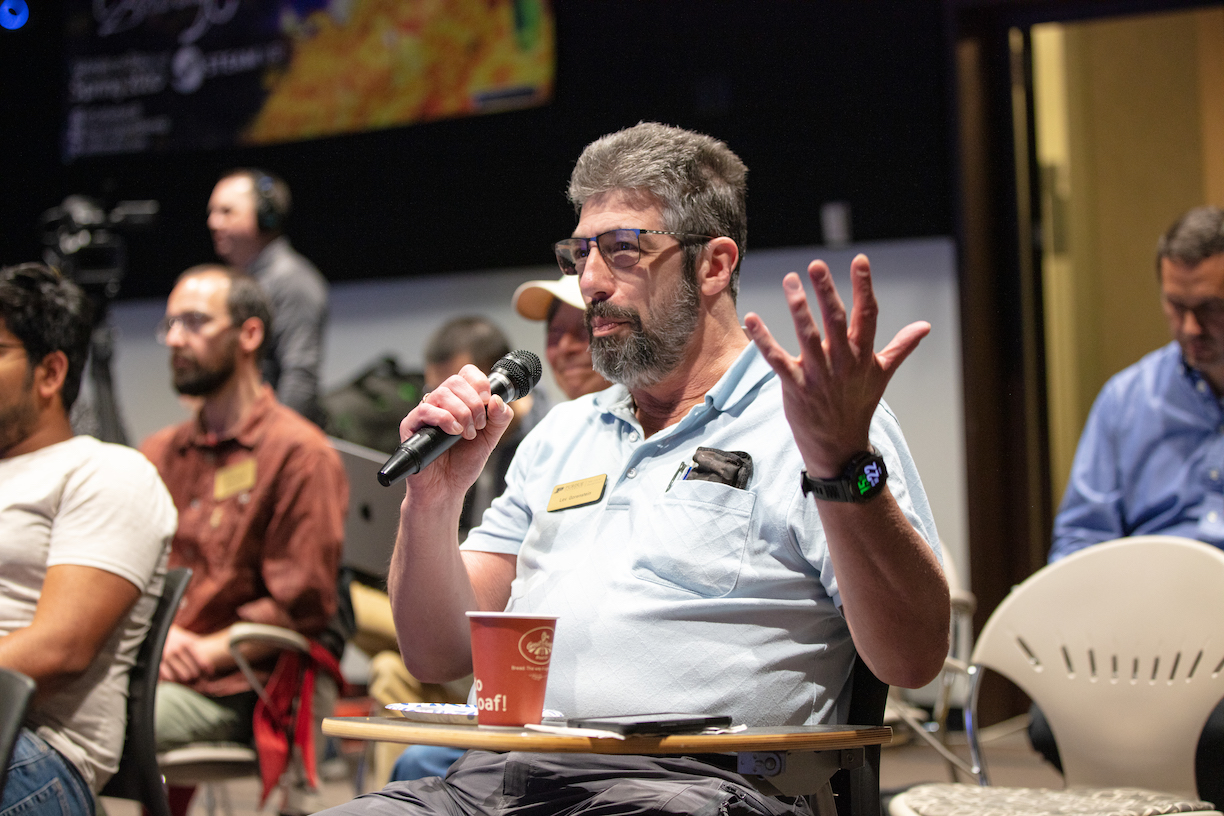News & Events
- There are no upcoming Student Events at this time.
Meet Your Mentor!
We sat down with our 2022 Anvil REU Mentors to discuss their role at RCAC, what their REU students will be working on, and much, much more. Keep reading below to learn more about your mentor.
Lev Gorenstein

Please introduce yourself:
My name is Lev Gorenstein, and I am a chemist by training, turned structural biologist turned Senior Computational Scientist with RCAC.
What is your job?
I am with the applications and user support team. A group of reformed domain scientists, we bridge the gap between hard-core researchers and hard-core systems engineers. My team maintains and supports applications stack on Purdue supercomputers, and teaches users how to use them well in their research workflows.
Why would I come to you for help?
I am happy to help with general Linux/Unix questions, cluster usage, job submission and monitoring, compiling, installing and using your applications, containerization, workflows and automations, computational strategies and data management. Also HPC engagement and outreach, as well as using HPC in the classroom through our Scholar cluster.
What’s one thing you wish you’d known when you started working in HPC?
I can’t think of anything here. I had to pick up a lot of cluster-related and computational knowledge, and I wish I’d known some of it already - but OTOH, nobody would’ve taught me these skills in a chemistry college. So you’ve gotta learn what you’ve gotta learn.
What’s one professional skill you’re currently working on?
Automating data management with Globus Flows and practicing composable infrastructure with Docker and Kubernetes.
What’s your go-to productivity trick?
Coffee. And attempts to eliminate distractions (Slack, email notifications, and the likes). Not very successful so far (except for coffee).
What behavior or personality trait do you most attribute your success to, and why?
Intellectual curiosity and interest in trying things out. Also, empathy and the ability to understand and relate to researchers’ needs (because I too have been one).
What was your first job?
After college, I was a junior researcher at the Bioorganic Chemistry Institute at the Siberian Branch of the Russian Academy of Science, working on structural aspects of drug-DNA interactions.
What’s the worst job you’ve ever had, and what did you learn from it?
I think I am quite privileged and lucky that I haven’t had worst jobs. Every job I held was interesting, stimulating, and fulfilling.
What was your favorite job you’ve ever had and why?
I would say it is my current position. The feeling that I directly impact and enable scientific accomplishments in fields ranging from psychology to nuclear physics is extremely rewarding. And tickles my inner science nerd, too.
What’s a mistake you made early on in your career, and what did you learn from it?
Short of spilling some concentrated acid on new shoes during organic chemistry lab (and a bit of pyro mishaps in high school), I do not think I’ve made too many mistakes. But that definitely helped to reinforce the notion that safety rules are inscribed in the blood of those who did not follow them.
What led you to this career?
I loved chemistry and always was a computer geek (that one weird guy who liked physical chemistry and solved PChem problems on a Soviet analog of programmable TI-57), so a job opportunity in the field of computational chemistry and structural biology seemed like a great match. I have studied DNA and proteins’ structure and stability, as well as maintained centralized software collection for the labmates. Eventually, I found that enabling others to run their simulations was more rewarding than running my own ones, and now I am a research computing facilitator.
What are you currently excited about in your job?
While engaging with our users, researchers at Purdue, and in other institutions across the nation, I get to see the amazing spectrum of things they do - and know that there is my contribution to their scientific success. And this year I have been invited to be on the organizing committee of the HUST (HPC User Support Tools) workshop at the annual Supercomputing Conference - which is a lot of very rewarding work in bringing together colleagues from HPC centers worldwide.
What’s one thing that surprised you about working at Purdue/RCAC?
I’d say, configuration management at scale. I had admined a couple of my own Linux servers (by hand), but here I saw how it is done on a 1000x scale. When a single commit to the repository automagically pushes the change to the entire cluster - this was something I theoretically knew but have not seen before in my researcher hat. Was also incredibly scary when it came to my own first commit.
What’s a work-related accomplishment that you’re really proud of?
I have coached multiple Student Cluster Challenge competition teams, where undergraduate students get to build their own small cluster and learn all sides of practical HPC while running real-world scientific applications (and competing with other student teams from across the world at a major conference). My biggest success was when my colleague and I trained a team of local Harrison High School students (hi Chuck, hi Mr. Klumpe!). The high school team was first ever in the main division in the history of this competition, and not only did they get to go to and experience the Supercomputing Conference, but they also ended up placing ahead of 3 college teams (out of 16 total)!
What’s the biggest misconception people have about your position?
“Oh, you work in IT? Can you fix my printer?”
How long have you been on the Anvil team/at RCAC?
I started at RCAC in 2013 and was on the Anvil team from the very beginning of it (2021).
Fun fact:
I am an avid backpacker and mountaineer, and I am a staff advisor for the Purdue Outing Club. I have two daughters, and the older one will be starting at Purdue this fall. And my Erdős number is 4.
Why did you decide to become a mentor for the REU program?
I always enjoyed teaching and mentoring (since my college days when I was on the organizing committee of chemistry olympiads and an assistant coach for a multi-high school physics competition). I was immensely privileged and lucky to have great teachers, mentors and role models in my life - and I hope to repay the moral debt and become one, too.
What do you hope the REU gets out of the program?
Knowledge, breadth of views, exposure to different aspects of HPC and other disciplines, professional experience, contacts and networking, satisfaction of working on a real problem with real impact.
How can this help them in their college career?
I think it’s the general experience and attitude approach. Learning new things, networking with culturally and academically diverse peers and mentors, a trip to PEARC conference - I so wish I had similar opportunity when I was a student! And even if specifics of their projects may not be directly applicable to some specific courseworks, the general approaches will be. Exposure to multiple disciplines helps develop mental cross-links and associations, and facilitates generally better learning outcomes.
How can this help them in their professional career?
There is a saying that higher education is what’s left when you forget everything you were taught in college. It’s a broad outlook, general attitude, ability and desire to learn and solve problems. Anything we learn enriches and develops us—and will help in their future career no matter what area they chose.
What value do you get from being a mentor for the REU program?
Their drive and energy are rejuvenating. These students have demonstrated initiative through the application and selection process, they are here not because they had to be here, but because they chose and wanted to be here. And I am happy to pass my skills, knowledge and experience to those who care and who want to learn. I see it as my contribution to a better tomorrow.
What will your REU students be working on specifically?
My REU project will be focused on developing a tool to deploy custom Jupyter notebook environments for classes, interactive demos, or training workshops. We have the Kubernetes infrastructure and tools for such deployments - but they are clunky and non-trivial, and the learning curve to master them is greater than what most instructors (especially in non-traditional areas) are willing to invest. Our project will focus on developing an “Easy button” to stand up custom Jupyter notebooks with a few clicks and configuration settings.
Where do you see HPC going in the next 10 years?
Traditional computational areas will continue to grow. In addition, I think we will see large adoption of HPC in fields that have been traditionally considered “non-computer”. Machine Learning developments, more digital data, more data science—this is coming to so many new areas in the long tail of science. Commoditization of HPC will lead to development of new, more intuitive, easier to use interfaces and workflows. But I am sure application specialists and facilitators would still be needed.
Have you ever been an REU or student employee?
I sort of have been (35 years ago, a required semester internship during year 5 of a 6-years M.S. program). I was in an industrial research lab, analyzing properties of grafted polymers. This was in a different country on a different continent in a different era, but it shared the same important features - mentors who care, students who care, experiential education, and overall getting better through being exposed to learning new things in a new environment. And that’s what matters.

